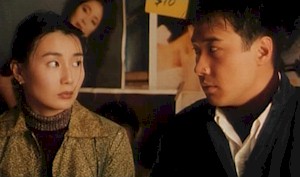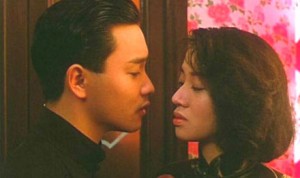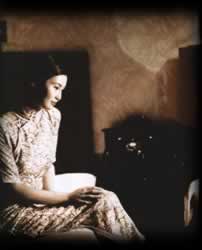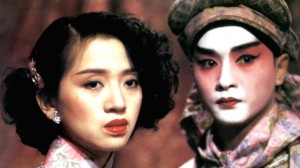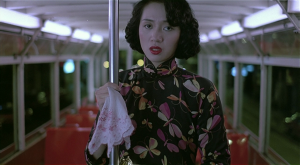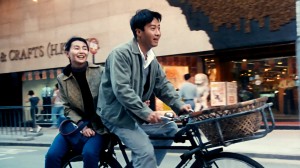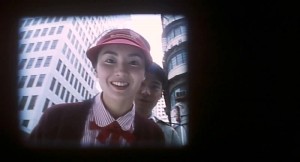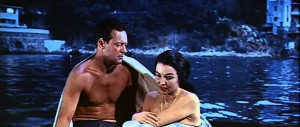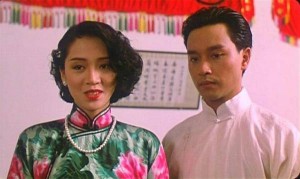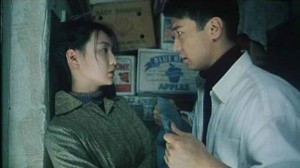Written for the Metrograph Chronicle in January 2020. — J.R.
There’s an unfortunate habit among some Yankee cinephiles — including distributors — to limit our perceptions of some overseas trends to single figures, so that Spanish cinema initially consisted of Luis Buñuel, then Pedro Almodóvar, Swedish cinema became synonymous with Bergman, and Hong Kong art cinema begins and ends with Wong Kar-wai. This helps to explain why I haven’t had much luck in keeping up with the careers of two other favorites of mine among Hong Kong directors, Peter Ho-Sun Chan and Stanley Kwan, whose finest work is every bit as important to me as Days of Being Wild and In the Mood for Love. If you haven’t yet seen Chanr’s Comrades: Almost a Love Story and/or Kwan’s Rouge, they’ll do a good job of suggesting what you might be missing.
Rouge, made in 1987, is set alternately in that year and in 1934. Comrades, Almost a Love Story, another Hong Kong not-quite romance shaped around two superstars, was made in 1996, opens in 1986, and ends first in Manhattan in 1995, then back again in 1986, when the title characters are arriving in Hong Kong, still strangers to the city and to each other.
Both films are steeped in nostalgia, yet both are also urgently, even desperately preoccupied with the future: — Hong Kong’s impending departure in 1997 from a century and a half of colonial rule as well as a fluctuating stock market. And not knowing the future inevitably means not being able to maintain a romantic relationship, so that both films are both wistfully and tragically preoccupied with roads not taken. Even if the tastes of both the future and the past are strikingly different in these dissimilar pictures, they do share a certain bittersweet tang, a sense of loss and abandonment laced with hope, a conflicted feeling of fond regret.
Ever since I saw my first (and still my favorite) Stanley Kwan film during my first visit to Asia in 1991 — encountering the premiere of Actress (also known as Centre Stage), a masterpiece about the silent Shanghai silent film actress Ruan Ling-yu, “the Chinese Garbo”,” at the Golden Horse Awards in Taipei — I’ve tended to regard Kwan as the Chinese George Cukor. For me, the key images in Cukor’s best work usually involve a woman’s empowering and narcissistic, existential perception of herself — epitomized by the infatuated (and self-infatuated) gender confusion of Sylvia Scarlett (Katharine Hepburn) in the 1935 picture bearing her name, Judy Garland mournfully yet triumphantly singing “The Man Who Got Away” with her musician friends in a closed nightclub in A Star is Born (1954), and Ava Gardner gazing at herself in a mirror in Bhowani Junction (1955). In Travels with My Aunt (1972), the character making all the sensual self-discoveries is a man (Alec McCowen). All these moments seem germane to the explorations of Kwan’s excellent 1998 documentary Yang + Yin: Gender in Chinese Cinema, and it’s worth adding that shortly after Rouge came out, Stanley Kwan became Hong Kong’s first openly gay film director.
In Rouge — my second favorite Kwan movie, which has many parallels to Actress — gender confusion is there from the very beginning, when we see Anita Mui as Fleur, a high-priced courtesan at a lush bordello-nightclub in Hong Kong’s Western District, applying her makeup in close-ups, then appearing in male drag to sing along with a man’s romantic lament from Chinese opera to a wealthy male customer. As we later discover, her beloved patron-lover Chen-pang (Leslie Cheung), a wealthy pharmacist, himself aspires to become a Chinese opera star. However, his family’s disapproval of both this aspiration and his desire to marry Fleur eventually leads the couple to plan a suicide pact. And a climactic shot framing them after they prepare to go through with this pact shows them both facing a mirror.
There’s an undeniable poignance in seeing Mui and Cheung together. Both were highly successful pop singers (as is Comrades’ Leon Lai) as well as iconic movie stars who died tragically a decade and a half later—Mui from cervical cancer, the openly bisexual Cheung from a suicidal leap from a hotel roof, spurred by depression. The fact that Mui plays a ghost throughout most of Rouge, appearing in 1987 to search for Chen-pang after he fails to join her in the netherworld, only enhances her ethereal, other-worldly performance. Furthermore, the almost monotonal and boxed-in views of present-day Hong Kong in the film are contrasted with the riotous colors and flowery shapes of Fleur’s bordello.
Mui was originally cast to play the real-life actress Ruan Ling-yu in Kwan’s Center Stage (who also ended up a suicide) before she was replaced at the last moment by Maggie Cheung, and the most striking parallel between Rouge and that film is the way both regard the decadent 1930s as a poetically mysterious haven in contrast to the more prosaic conditions and circumstances of the present.
The titularle leads of Comrades, Maggie Cheung’s Qiao Li and Leon Lai’s Xiao-Jun Li, are both expat Mainlanders — she’s from Guangzhou, he’s from the North — who have to learn Cantonese in order to live in Hong Kong, so we wind up sharing their foreigners’ viewpoint of the city. But we’re also asked periodically to view them as seen from inside an ATM, suggesting that everything in Hong Kong can be made to look weird, including them and us and capitalism itself. (Rouge performs its own feat in making contemporary, everyday artefacts appear daffy when its present-day hero describes Coca-Cola to its ghost heroine as “foreign herbal tea”.) The fact that the two Mainland comrades meet in a McDonald’s and then bond over her advice that he should learn English already shows us how foreignness is really a matter of relativity, as does the fact that his English teacher, Jeremy, is played by Christopher Doyle, the Australian-born cinematographer who bore the same relation to the Hong Kong New Wave filmmakers, including Wong and Kwan, that Raoul Coutard had in the 1960s to the French New Wave. It’s surely indicative of the anxiety about Hong Kong’s future that one line that Jeremy gets his class to recite in English is, “We all go to hell”.
The tenderness and heart shown by Chan and his female screenwriter Ivy Ho in following their comrades as they slide between friendship and romance —-mysteriously united by Hong Kong’s unstable economy just as surely as the 1930s lovers in Rouge wind up being divided by class — has the uncanny feel of following the vicissitudes and denials of real people in much the same way that the four seasons of Crazy Ex-Girlfriend on cable TV did. (All the other Chan films I’ve seen, including his 1999 Hollywood feature The Love Letter, show the same warmth towards his characters.) In Rouge, only the newspaper editor and his girlfriend in 1987 have the rudiments of this sort of reality; the 30s couple, by contrast, seem so trapped by their own iconic images and poses that they’re already ghosts even before they plan their suicide pact. The late film theorist Gilberto Perez called film actors and films “material ghosts,” and it’s worth adding that both Comrades and Rouge are haunted by Hollywood: the spirit of William Holden — occasioned by his visit to Hong Kong in the mid-50s to make Love is a Many Splendored Thing — hovers over the former, and the ephemeral, decadent glamour of Mui and Cheung in the latter evokes many stateside counterparts.
One final point. In the latest “top twenty” poll voted by members of the Chinese Movie Database, where Wong’s In the Mood for Love came in first and Days of Being Wild came in third, Comrades occupies the eighth spot and Kwan’s Actress the fifth. Although Rouge doesn’t figure in this list, it literally swept the Hong Kong Film Awards back in 1989, winning best actress, director, editing, original film score, film song, and picture. All of which makes Rouge clearly a film awaiting rediscovery, and Comrades — even for those like me who already consider it a favorite — ripe for reseeing.

